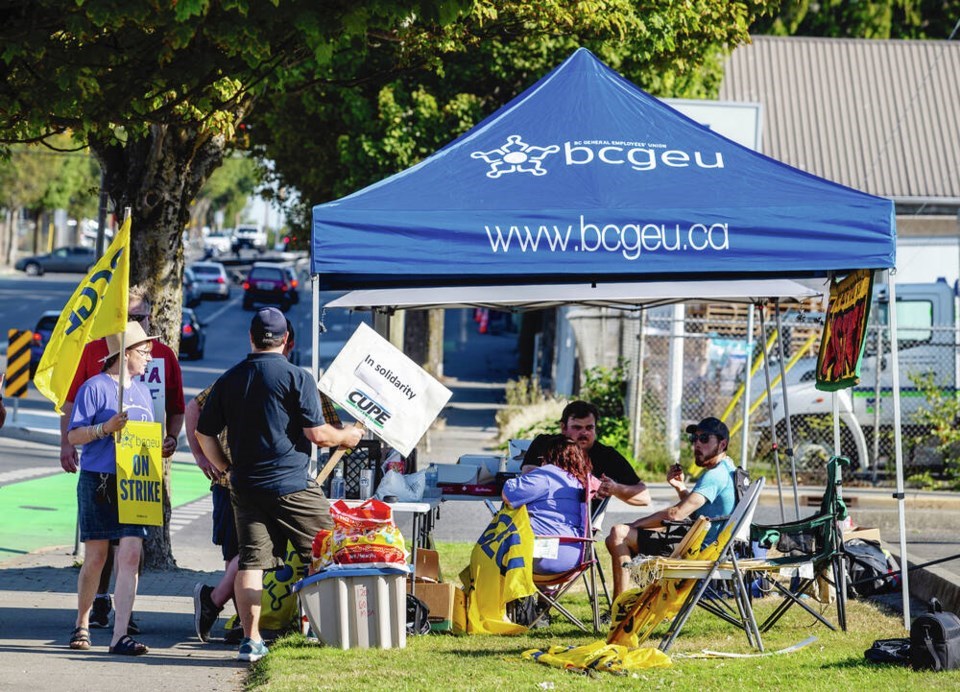The B.C. NDP government is facing the spectre of a late summer strike by the province’s largest public sector union, after negotiations crumbled.
The BC General Employees’ Union says it will take a strike vote from its more than 34,000 members in mid-August, setting up the potential for job action by Labour Day.
“We do not take that action lightly, but we did that after the employer, the government, failed to move meaningfully on the asks that were critically important to our members,” said BCGEU president Paul Finch.
The BCGEU was the first union to start contract talks with government this year, and is the first to walk away from the table. There are more than 452,000 unionized employees seeking new deals, ranging from teachers, to nurses, social workers, health-care employees, post-secondary staff and more.
The two sides are nowhere close to a deal.
Government tabled a two-year, 3.5 per cent wage offer that contained the ability to redirect one per cent towards $0.30 an hour general wage for lower-paid workers in the second year.
The BCGEU countered with a two-year, 8.25 per cent proposal, with a cost-of-living protection on the second year.
“So as you can imagine, we’re significantly apart there,” said Finch.
The unions have high hopes, given they scored a 13.75 per cent wage increase over three years in the last round of bargaining.
But they’re running up against orders from Premier David Eby to tighten the budgetary purse strings and start digging his government out of the $13-billion structural deficit it has built through overspending.
The Eby government is optimistically calling its offer the "balanced measures update,” though there’s currently no plan for the NDP to get out of deficit within the next two years.
“I am hopeful the parties will return to the table soon — it’s best to keep the bargaining discussions at the table so the parties can focus on reaching a settlement,” Finance Minister Brenda Bailey said in a statement, adding “we respect the union’s prerogative” to take a strike vote.
The BCGEU doesn’t have much time for the NDP’s claims the provincial treasury is bare.
“The deficits projected for the 2025-2028 period do not represent a fiscal crisis,” the BCGEU said in a new research report released alongside news of its strike vote.
Instead, the union noted New Democrats have socked away $4 billion annually in contingency funds over their three-year budget plan.
“This means there is an additional $4 billion in spending capacity for each year that could be allocated to wage increases, hiring and service expansion,” read the report.
Not quite.
The government uses contingency funds to pay for the annual cost of fighting wildfires, which can fluctuate wildly but last year cost almost $770 million and the year before came in at $1.1 billion. It also set aside $400 million off the top to cover CleanBC programs.
Which puts the contingency fund somewhere closer to $2.5 billion this year. And that’s not counting the $1.8 billion the government lost for scrapping the carbon tax.
The BCGEU’s contract proposal is roughly near $4 billion over two years. The government just under $2 billion. Both will strain the budget.
The BCGEU’s report goes on to suggest ways government could raise more revenue, including a land value tax, upping taxes on corporations and high-income earners and boosting property tax audits. One idea, “insourcing” more services to within government, would boost union membership. Another, extracting more revenue from LNG, mining and renewable energy projects, is going nowhere with a premier who’s preoccupied with fast-tracking those kinds of projects.
All of which sets up a showdown between New Democrats and their longtime union allies, to play out in the dying days of summer.
Rob Shaw has spent more than 17 years covering B.C. politics, now reporting for CHEK News and writing for The Orca/BIV. He is the co-author of the national bestselling book A Matter of Confidence, host of the weekly podcast Political Capital, and a regular guest on CBC Radio.
🚨New newsletter alert! Stay ahead of the curve in B.C. politics. Get expert political analysis delivered straight to your inbox, plus inside scoops and other stories from across the province. Sign up here for the Capital & Coast newsletter.



